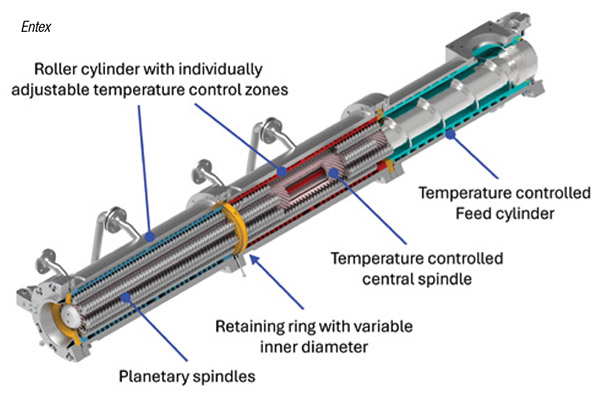Traditionally, many polymerization reactions are carried out batchwise in reactor vessels, with the reaction taking place in solution, emulsion or in a melt. This procedure reaches its limits if, for example, the reaction is very exothermic or the viscosity increases considerably during the course of the reaction. To handle these situations, Entex Rust & Mitschke GmbH (Bochum, Germany; www.entex.de) has developed the planetary roller reactor (PRR), which the company introduced at Achema 2024 (Frankfurt, Germany; June 10–14).
The PRR (diagram) is a multi-modular extrusion system that is mechanically adaptable while providing precise thermal process control. The system can mix, homogenize, degas and gently remove volatile components — even from highly viscous extrudates. The PRR can serve as a continuous reactor, particularly for reactions involving highly viscous thermoplastic melts.

The system is scalable from a few kilograms per hour to more than 10 ton/h, depending on the design size. The system also offers greater process safety, because the total amount of reactive components in the process are relatively low compared to a batch process. Thanks to the precise temperature and pressure profiles, the PRR is able to reproducibly deliver high product quality. Efficient degassing in the system results in lower emissions, as well as fewer volatile degradation products, compared to batch systems, the company says.
Unlike conventional single- or twin-screw extruders, the PRR can still operate without any problems even when it is only filled to around 10%. This gives the operator more flexibility when adjusting capacity.
The extruder can be continuously fed with recipe-related amounts of various solids and liquids in different process and temperature control zones, and the residence time in the individual process zones of the process section can be controlled mechanically. A chemical reaction can extend over several process zones and run through different pressure and temperature conditions, which specifically influence the course of the reaction.
For all of Chemical Engineering‘s coverage of ACHEMA 2024, please also read:
Day 1 Live Coverage from ACHEMA
Day 2 Live Coverage from ACHEMA